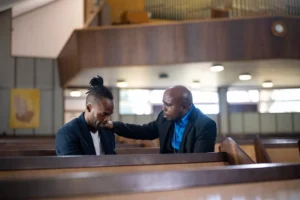This Office Hours column is a long-delayed sequel to “Is All Faith Blind?”, which should be read first.
* * *
As usual, Mary was rooting around in her backpack for something. She pulled out a coffee mug and set it on my desk.
“Another one?” I laughed.
She grinned too. “I know I’m always making off with your coffee mugs, but this one’s different. It’s the first I ever took. For three years I’ve been bringing it back and forth to your office. Now that I’m graduating, I thought I’d better return it for good.”
So this was her farewell visit. I made myself busy with coffee to hide an unexpected rush of emotion. Mary had first visited my office three years ago to spout off about a classmate who had offended her by mentioning ‘the will of God.’ For some time now she had been a Christian herself, though I wasn’t quite clear by what miracle of grace that had happened. I had come to think of her as something like a spiritual grandchild.
She sat pensively. I took my seat again.
“Professor T —”
I waited.
“Professor T, Christianity is still new to me. The other day I read what Paul says about being ‘transformed by the renewing of your mind.’ That made me think of something you said during that first time I visited you. Do you remember? I’d said something stupid about ‘blind faith.’ You sort of winced and said ‘Not blind faith. Faith doesn’t mean you don’t reason, it means you ground your reasoning on the trustworthiness of God.'”
“I remember.”
“Well, I’m almost through with college, and I’m going to have to reason about a lot of things. Can you explain what you meant back then? How do Christians reason? You explained once before — but that was a long time ago and I didn’t understand you very well.”
“I’d be glad to try again. But you know some Christians might explain this a bit differently than I do.”
“That’s OK. Where do you start?”
“I start with the fact that God is the source of all truth, all knowledge. If you say that we can learn things by reasoning about them, I agree, but reasoning can’t prove that reasoning works. It works because of God. First He fashioned a world that makes sense, then He fashioned our minds so that it makes sense to us. The only reason we can trust what we know is that the Fashioner Himself is trustworthy. Do you follow me so far?”
“I think so. If that’s true, then in a way, all real knowledge is — well, something like revelation. Right?”
“It’s not like revelation. It is revelation.”
“I thought revelation meant the Bible.”
“Revelation means whatever God makes known. The Bible is ‘special’ revelation — it’s what God reveals to His people. But He reveals some things to all human beings, even apart from the Bible. That’s called ‘general’ revelation.”
“Things He reveals even to nonbelievers? Like what?”
“Like the world’s existence. You don’t have to read the Bible to know that the world is real, though you might get confused about it. Like our own existence. Like the law of non-contradiction. Like ‘one plus one is two.’ Like ‘equals added to equals are equal.’ Like the fact that good is to be sought, and evil is to be avoided. Lots of things — the universal common sense of the human race. If God hadn’t made these things known already, the Bible couldn’t help us.”
“But if we have this ‘general’ revelation already, why did God give us the Bible? Was it to learn that He exists?”
“No, because even general revelation tells us that. Do you remember what Paul and Barnabas said in the 14th chapter of Acts?”
“When they were in Lystra?”
“Yes. They had just healed a man, and the pagan crowds thought they were gods. What did they say?”
“That the crowds should worship the true God instead.”
“Right, but how were those pagans supposed to know about the true God?”
“I remember. They said that even in past generations, when God had allowed all the nations to walk in their own ways, He had left ‘witness’ to Himself among them. I never understood that. There weren’t missionaries before Gospel times, were there?”
“There might have been, but that’s not what they meant. Their words were ‘Yet he did not leave Himself without witness, for He did good and gave you from heaven rains and fruitful seasons, satisfying your hearts with food and gladness.’”
“I don’t see how rain and fruit and gladness could witness to God.”
“Don’t you? Think. Why should there even be rain and fruit and gladness in the world? Why should there be a world at all?”
“Oh, I get it. Creation witnesses to its Creator.”
“Sure. ‘The heavens declare the glory of God.” God left Himself another witness, too.”
“What’s that?”
“Godward longing. Ecclesiastes says God has ‘set eternity in the hearts of men.’ We have an empty space in us that can only be filled by God.”
“But how is that knowledge? There’s a difference between longing for something and knowing something.”
“It’s knowledge because it tells us that none of our idols can save.”
“You mean like when the Athenians had an altar inscribed ‘To An Unknown God’?”
“Right. Paul made a point of it when he talked with them.”
“But I thought we should use the Bible to reason with nonbelievers.”
“Of course we want to teach them about the Bible. But we don’t start with the Bible. It’s not even biblical to do that. We should do as Paul did: Start with something they know already.”
“Okay, I’m beginning to see it. We base our reasoning on the trustworthiness of God. First He gives us general revelation, which is common ground even with nonbelievers. Then he gives us special revelation — the Bible. But you still haven’t answered my question. What does the Bible add?”
“Lots. The Athenians knew that there was ‘An Unknown God,’ but they still didn’t know who He was.”
“I get it. And I guess we also need the Bible to know about moral law.”
“I wouldn’t say that. The Bible tells us more about moral law, but some knowledge of right and wrong is available even without it. He left witness among the nations not only to His reality but to His moral requirements.”
“That’s hard to believe.”
“It shouldn’t be. The Bible mentions at least three moral witnesses. First is the witness of conscience — what Paul calls the law ‘written on the heart.’ Second is the witness of the harvest — God has so arranged the world that eventually our deeds catch up with us. Third is the witness of our design. For example, you don’t have to read the Bible to recognize that men and women are complementary to each other — each provides something lacking in the makeup of the other. Men can’t do that for men, and women can’t do that for women. All these things are available for reasoning.”
“But don’t people deny all those things, Professor T?”
“Yes, but they aren’t as ignorant as they make themselves out to be. If people hold down their conscience, we can dredge it up. If they ignore the connection between deeds and consequences, we can connect the dots. If they avert their eyes from the obvious facts of design, we can call attention to them. In these ways we can reason about right and wrong even with nonbelievers.”
“OK, so we know some things already about God and His moral requirements already. So what does the Bible add?”
“It tells us more about God and His moral requirements. It makes even what we know already harder to ignore. Most important, it tells us the plan of salvation. You see, the reality of God isn’t good news if we don’t know how to be reconciled with Him. And His moral requirements aren’t good news if we know we haven’t lived up to them. We need the real Good News, the Gospel. We need to know that we can be forgiven and made whole.”
“I’ve surely learned what that’s about,” Mary said. She sat quietly for a moment, then said, “Professor T, even though I’m about to graduate, I feel that I’m only just now ready to begin.”
“Of course you do, because you really are just beginning. You’re a new creation, a new-born child of Christ.” I cleared my throat. “Oh, before you go —” Opening the drawer, I pulled out an object tied with a bow and put it in her hands. “I just thought that since you’re graduating, it’s time you had one of these to call your own.”
She smiled. “Thank you for the coffee mug, Professor Theophilus.”
Copyright 2002 J. Budziszewski. All rights reserved.









